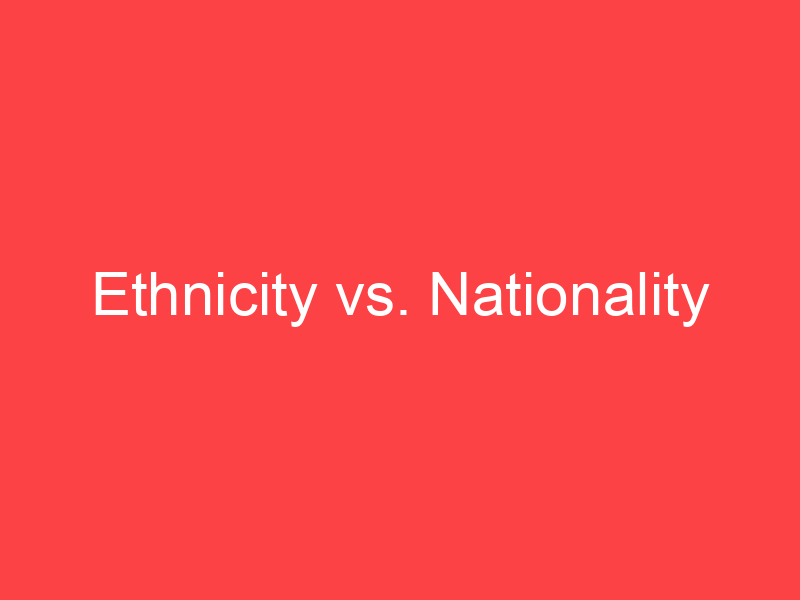Main Difference
The main difference between Ethnicity and Nationality is that the Ethnicity is a socially defined category of people who identify with each other and Nationality is a relationship between an individual human and a state
-
Ethnicity
An ethnic group, or an ethnicity, is a category of people who identify with each other based on similarities such as common ancestry, language, society, culture or nation. Ethnicity is usually an inherited status based on the society in which one lives. Membership of an ethnic group tends to be defined by a shared cultural heritage, ancestry, origin myth, history, homeland, language or dialect, symbolic systems such as religion, mythology and ritual, cuisine, dressing style, art, and physical appearance.
Ethnic groups, derived from the same historical founder population, often continue to speak related languages and share a similar gene pool. By way of language shift, acculturation, adoption and religious conversion, it is sometimes possible for individuals or groups to leave one ethnic group and become part of another (except for ethnic groups emphasizing racial purity as a key membership criterion).
Ethnicity is often used synonymously with ambiguous terms such as nation or people. In English, it can also have the connotation of something exotic (cf. “White ethnic”, “ethnic restaurant”, etc.), generally related to cultures of more recent immigrants, who arrived after the founding population of an area was established.
The largest ethnic groups in modern times comprise hundreds of millions of individuals (Han Chinese being the largest), while the smallest are limited to a few dozen individuals (numerous indigenous peoples worldwide). Larger ethnic groups may be subdivided into smaller sub-groups known variously as tribes or clans, which over time may become separate ethnic groups themselves due to endogamy or physical isolation from the parent group. Conversely, formerly separate ethnicities can merge to form a pan-ethnicity, and may eventually merge into one single ethnicity. Whether through division or amalgamation, the formation of a separate ethnic identity is referred to as ethnogenesis.
-
Nationality
Nationality is a legal relationship between an individual person and a state. Nationality affords the state jurisdiction over the person and affords the person the protection of the state. What these rights and duties are varies from state to state.By custom and international conventions, it is the right of each state to determine who its nationals are. Such determinations are part of nationality law. In some cases, determinations of nationality are also governed by public international law—for example, by treaties on statelessness and the European Convention on Nationality.
Nationality differs technically and legally from citizenship, which is a different legal relationship between a person and a country. The noun national can include both citizens and non-citizens. The most common distinguishing feature of citizenship is that citizens have the right to participate in the political life of the state, such as by voting or standing for election. However, in most modern countries all nationals are citizens of the state, and full citizens are always nationals of the state.In older texts the word nationality, rather than ethnicity, is often used to refer to an ethnic group (a group of people who share a common ethnic identity, language, culture, lineage, history, and so forth). This older meaning of nationality is not defined by political borders or passport ownership and includes nations that lack an independent state (such as the Arameans, Scots, Welsh, English, Andalusians, Basques, Catalans, Kurds, Kabyles, Baloch, Berbers, Bosniaks, Kashmiris,
Palestinians, Sindhi, Tamils, Hmong, Inuit, Copts, Māori, Sikhs, Wakhi, Székelys, Xhosas and Zulus).Individuals may also be considered nationals of groups with autonomous status that have ceded some power to a larger government.
-
Ethnicity (noun)
The common characteristics of a group of people, especially regarding ancestry, culture, language or national experiences.
-
Ethnicity (noun)
An ethnic group.
-
Ethnicity (noun)
Race; common ancestry.
-
Nationality (noun)
Membership of a particular nation or state, by origin, birth, naturalization, ownership, allegiance or otherwise.
-
Nationality (noun)
National, i.e. ethnic and/or cultural, character or identity.
-
Nationality (noun)
A people sharing a common origin, culture and/or language, and possibly constituting a nation-state.
-
Nationality (noun)
Political existence, independence or unity as a national entity.
-
Nationality (noun)
Nationalism or patriotism.

